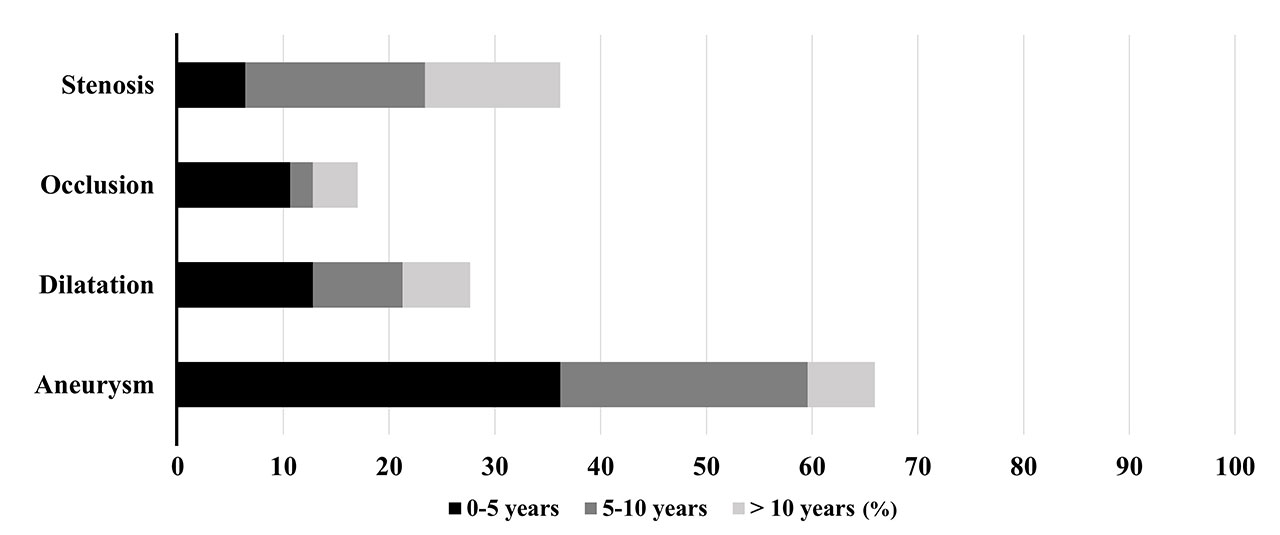Session Information
Session Type: Poster Session (Sunday)
Session Time: 9:00AM-11:00AM
Background/Purpose: Arterial involvement is a manifestation of systemic vasculitis in Behçet’s disease (BD). Changes to BD arterial lesions over time can help predict patient prognosis. Few reports have been published, however, on arterial lesion during time courses in BD patients. We evaluated the angiographic patterns and changes to arterial lesions in BD patients.
Methods: We retrospectively reviewed BD patients with arterial lesions from January 1995 to December 2015. Arterial lesion patterns were categorized as stenosis, occlusion, dilatation, or aneurysm. Patients were divided into three groups by length of time (0-5 years, 5-10 years, and >10 years) of symptom duration before BD with arterial involvement diagnosis. Progression of arterial lesions was assessed by follow-up imaging. The Cox proportional hazards model was used to evaluate hazard ratios (HR) with a 95% confidence interval (CI) for arterial lesion progression.
Results: For 45 BD patients with arterial involvement, 99 total arterial lesions were observed as follows: stenosis (n = 27), occlusion (n = 9), dilatation (n = 19), and aneurysm (n = 44). Aneurysm was the most common angiographic lesion in 17 patients (36.2%), whereas only 3 patients (6.4%) had stenosis within five years of symptom onset (Figure 1). In patients with a symptom duration of 10 years or more, however, stenosis (n = 6, 12.8%) was most frequently observed, followed by aneurysm (n = 3, 6.4%). In 23 patients who underwent follow-up imaging (median 5.7 [IQR 2.8-7.5] years), 11 new lesions were detected in 8 patients (8/23; 34.8%) as follows: stenosis (n = 5), occlusion (n = 0), dilatation (n = 1), and aneurysm (n = 5). One of the 14 stenoses progressed to occlusion, and 2 of the 12 dilated lesions progressed to aneurysm. In multivariable analyses, arterial lesion progression was significantly associated with hypertension (HR 4.26, 95% CI 1.08-16.87, p = 0.039) and arterial involvement in a lower extremity (HR 5.44, 95% CI 1.09-27.10, p = 0.039).
Conclusion: In BD with arterial involvement, aneurysm was most often observed in early stages (symptom duration ≤ 5 years), while stenosis was more often observed during later stages (symptom duration > 10 years). Hypertension and arterial involvement in a lower extremity were found to be risk factors for arterial lesion progression.
To cite this abstract in AMA style:
Choi S, Nam S, Lee J, Lim D, Oh J, Hong S, Kim Y, Lee C, Yoo B. Angiographic Patterns and Changes in Arterial Lesions in Patients with Behcet’s Disease [abstract]. Arthritis Rheumatol. 2019; 71 (suppl 10). https://acrabstracts.org/abstract/angiographic-patterns-and-changes-in-arterial-lesions-in-patients-with-behcets-disease/. Accessed .« Back to 2019 ACR/ARP Annual Meeting
ACR Meeting Abstracts - https://acrabstracts.org/abstract/angiographic-patterns-and-changes-in-arterial-lesions-in-patients-with-behcets-disease/

